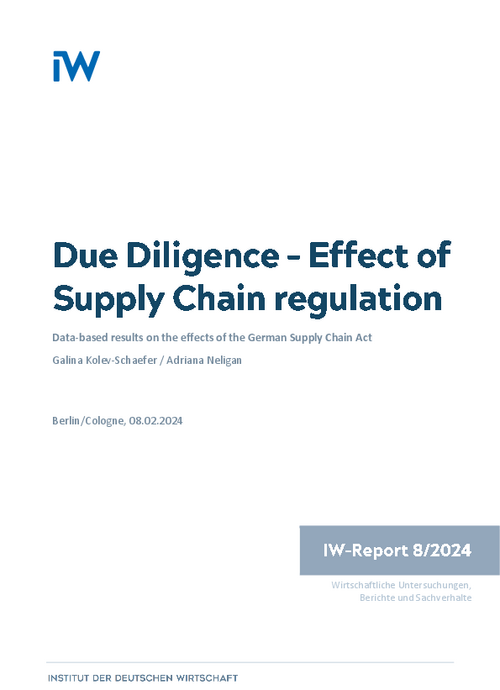After the agreement of the European Parliament and the Council of the EU in December 2023, a few formal steps remain to introduce the Corporate Sustainability Due Diligence Directive (CSDDD).

Due Diligence - Effect of Supply Chain regulation: Data-based results on the effects of the German Supply Chain Act

After the agreement of the European Parliament and the Council of the EU in December 2023, a few formal steps remain to introduce the Corporate Sustainability Due Diligence Directive (CSDDD).
The legislation is intended to improve environmental and labor standards along the chain of international activities of European companies. However, the scope is far-reaching, and its implementation will be associated with significant costs of compliance. Thus, the directive will not only deteriorate the competitiveness of European companies but also endanger the economic development of developing and emerging economies because their attractiveness as suppliers of intermediate or final products for the European market will significantly decrease.
The experience with supply chain due diligence regulations from EU member states supports these arguments. The present paper investigates the adverse effects of the German supply chain act one year after its introduction by using trade data and the results of a recent survey among German companies:
- Trade data: It shows that imports in the high-risk sector of apparel from countries with problematic enforcement of sustainability standards like Bangladesh and Pakistan have decreased by more than 20 percent since the introduction of the law. This development seems not to be driven by shrinking demand in Germany but is rather an early sign of trade diversion due to this non-tariff barrier to trade especially with these countries.
- Company survey: Furthermore, survey results indicate that the range of companies affected by the existing German regulation is much wider than those directly covered by the law as many companies are indirectly affected as customers or suppliers. More than one out of eight companies have decided to purchase products or produce increasingly in countries with high human rights and environmental protection standards. For directly and indirectly affected firms the share is even 22 per cent. This explains at least partly the drop in imports from countries with weak governance.
As it cannot be ruled out that supply chain regulations negatively impact development in third countries, there is a need for more experience and time to design the CSDDD in a way that it does not only represent a burden for European companies and disadvantage for developing countries. The scope should be restrained to reduce legal uncertainty and increased only gradually as soon as European companies are prepared for the next step of the implementation. Generally, a risk-based approach is preferable, where companies are obliged to monitor and report on the sustainability of their supply chains only when there is clear evidence of high risks of non-compliance with sound environmental and labor standards. Furthermore, the obligations to monitor the production conditions of intermediate products should be constrained to the direct suppliers like in the German approach instead of covering the whole chain of activities, as it is barely possible for companies to trace the whole chain of activities associated with the production of intermediate products – especially for highly complex products. The proposed CSDDD needs to undergo a major review to assure that it effectively improves production conditions abroad without significant negative side effects and risks for economic development in developing and emerging economies.

Due Diligence - Effect of Supply Chain regulation: Data-based results on the effects of the German Supply Chain Act

More on the topic
Financing the Sustainability Agenda
The EU has set legally binding targets for climate-neutrality by 2050. To succeed in the transition to a low-carbon economy, companies need to continuously develop new and improved climate-friendly technologies, and to adopt or move towards low-carbon business ...
IW
Green Nudging – a key against littering?
The demand for cleanliness in cities is increasing: "Littering" - the illegal littering of public spaces - does not only cause costs for the environment and society, but also has significant financial consequences through increased cleaning costs.
IW